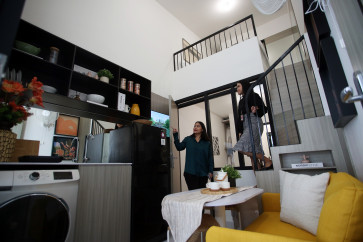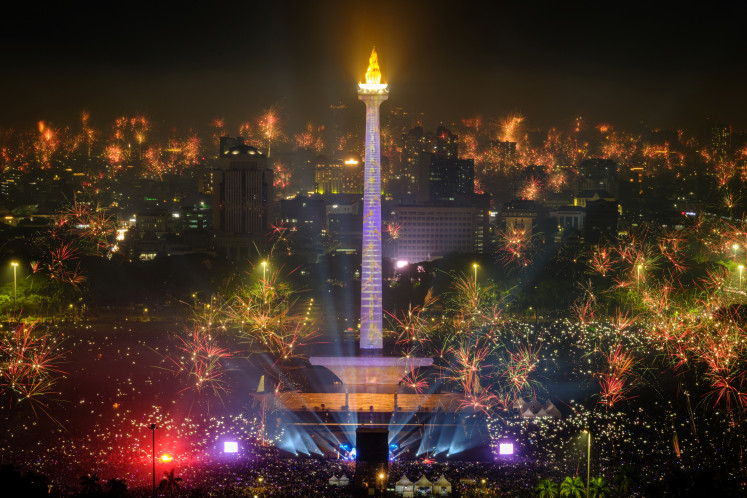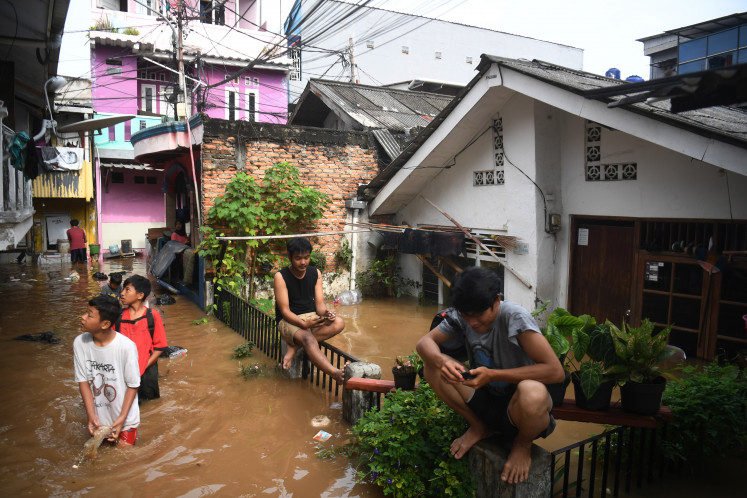Popular Reads
Top Results
Can't find what you're looking for?
View all search resultsPopular Reads
Top Results
Can't find what you're looking for?
View all search resultsShipyard industry still needs support
Indonesia is the largest maritime country in the world, with approximately 17,504 islands spread from Sabang in Sumatra to Merauke in Papua
Change text size
Gift Premium Articles
to Anyone

I
ndonesia is the largest maritime country in the world, with approximately 17,504 islands spread from Sabang in Sumatra to Merauke in Papua. This topography requires strong shipping support with the sea as a connecting line, whose support will also require strong shipyards to ensure strong vessel supplies and repayments because the two industries are intertwined.
Currently, 117 shipyard companies under the Indonesian Shipbuilding Association (Iperindo) operate around 27,000 commercial vessels — 21 percent of which are older than 25 years — across the country. Most of the firms base their businesses in Surabaya, East Java, (21 companies) and in Batam (15 companies). Other than shipyards, Iperindo members also consist of 72 supporting industries companies, four classification bureaus and five consultant companies. Some of them are cable factories, paint factories, classification companies and ship designers, among other businesses.
During its golden era supported by a coal price boom in 2010 and 2011, as many as 150 shipyards operated in the country. However, only around 50 percent of these shipyards were in operation at the time.
Batam, as a free trade zone, offers a big opportunity in shipbuilding as the required engines and spare parts are free of duty. As many as 15 shipyards base their businesses in the area. The question arises whether or not Batam can overtake Singapore’s market. This is quite difficult to do as the tanker repair process in Singapore, for instance, only takes two weeks thanks to the availability of supporting industries and manpower. In comparison, the same process needs six weeks in Indonesia as shipyard facilities in the country are not as sophisticated as in the city-state.
The shipyard business itself generally consists of two jobs, namely ship repair and construction, both of which have different income characteristics. As for ship repair, it has a relatively small revenue but has a larger profit margin of between 20 and 25 percent. However, ship construction can gain a higher revenue but a lower profit margin compared to the repair business.
One of the problems of Indonesia’s shipyard industry is that it still imports 65 to 70 percent of its raw materials. Trade Ministry data shows that ships and floating building imports ranked sixth in 2018 imports and amounted to US$1.31 trillion, far higher than the aviation industry and its spare part imports worth $908 million.
In fact, Indonesia as a maritime country is expected to champion the shipping industry and its supporting sectors in the region. The supporting industries must grow so that the quality of local products will improve. If more local products are available, imports will decline in the next five to 10 years, and the country can even export these products.
Meanwhile, Iperindo has also pushed the Industry Ministry to exempt raw materials needed by the sector from import duties and value added tax because when compared to shipyard businesses in Malaysia, Vietnam and China, components in Indonesia cost at least 15 percent higher due to import duties of 5 to 12 percent.
It is not just about lower prices. China, for instance, also offers more relaxed terms for acquiring a ship. A company can buy one with a down payment of 10 percent, which can be paid in four to five installments, and is allowed to pay the remaining 90 percent of the price once the ship’s construction is completed.
Not only does it require the government’s support, the shipyard industry also needs financial support from banks. Investment loans abroad could be repaid in up to 15 years, but in Indonesia, payment installments must be done within five to seven years on average. The situation weighs on the company’s cash flow, forcing many companies to import used ships. Banks also have their respective considerations in providing financing amid slowing economic growth. On the other hand, Iperindo also expects lending interest rates to lower to single digits.
Going forward, ships made in Indonesia must meet international standards so that they can compete with foreign products, especially from China. Consistent vessel standards can also boost the industry’s efficiency and keep the prices of ships benign so that banks will not be reluctant about receiving them as loan collateral.
The cabotage principle applied by the government can be a stimulus for the domestic shipping industry, but as long as building a new ship remains difficult due to a lack of components and raw materials, a stronger industry has yet to set sail.
The principle gives the government the right to prohibit foreign ships from sailing and trading in its waters.
However, if the ecosystem has not yet been formed, development of the shipyard business will be merely seasonal. The business also needs a beneficial global situation to gain momentum. Other than that, government institutions have to set aside their sectorial egos in order to create a strong ecosystem for the industry.
The writer is regional Analyst, PT Bank Mandiri (Persero) Tbk.









